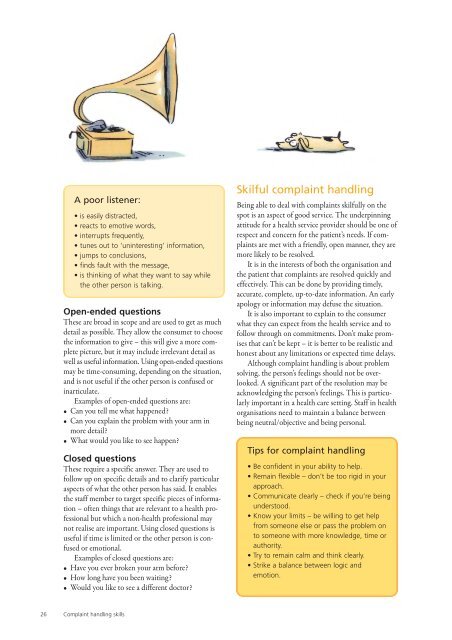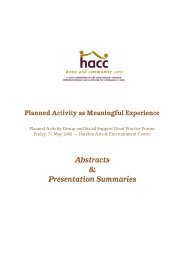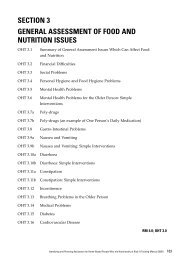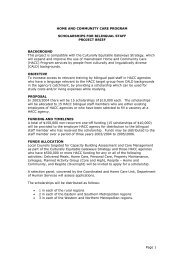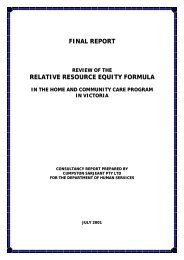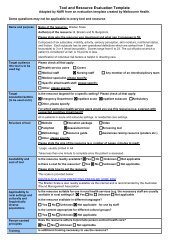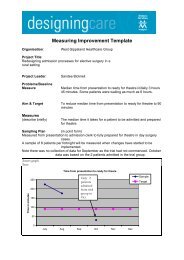Guide to Complaint Handling in Health Care Services
Guide to Complaint Handling in Health Care Services
Guide to Complaint Handling in Health Care Services
You also want an ePaper? Increase the reach of your titles
YUMPU automatically turns print PDFs into web optimized ePapers that Google loves.
A poor listener:<br />
• is easily distracted,<br />
• reacts <strong>to</strong> emotive words,<br />
• <strong>in</strong>terrupts frequently,<br />
• tunes out <strong>to</strong> ‘un<strong>in</strong>terest<strong>in</strong>g’ <strong>in</strong>formation,<br />
• jumps <strong>to</strong> conclusions,<br />
• f<strong>in</strong>ds fault with the message,<br />
• is th<strong>in</strong>k<strong>in</strong>g of what they want <strong>to</strong> say while<br />
the other person is talk<strong>in</strong>g.<br />
Open-ended questions<br />
These are broad <strong>in</strong> scope and are used <strong>to</strong> get as much<br />
detail as possible. They allow the consumer <strong>to</strong> choose<br />
the <strong>in</strong>formation <strong>to</strong> give – this will give a more complete<br />
picture, but it may <strong>in</strong>clude irrelevant detail as<br />
well as useful <strong>in</strong>formation. Us<strong>in</strong>g open-ended questions<br />
may be time-consum<strong>in</strong>g, depend<strong>in</strong>g on the situation,<br />
and is not useful if the other person is confused or<br />
<strong>in</strong>articulate.<br />
Examples of open-ended questions are:<br />
• Can you tell me what happened?<br />
• Can you expla<strong>in</strong> the problem with your arm <strong>in</strong><br />
more detail?<br />
• What would you like <strong>to</strong> see happen?<br />
Closed questions<br />
These require a specific answer. They are used <strong>to</strong><br />
follow up on specific details and <strong>to</strong> clarify particular<br />
aspects of what the other person has said. It enables<br />
the staff member <strong>to</strong> target specific pieces of <strong>in</strong>formation<br />
– often th<strong>in</strong>gs that are relevant <strong>to</strong> a health professional<br />
but which a non-health professional may<br />
not realise are important. Us<strong>in</strong>g closed questions is<br />
useful if time is limited or the other person is confused<br />
or emotional.<br />
Examples of closed questions are:<br />
• Have you ever broken your arm before?<br />
• How long have you been wait<strong>in</strong>g?<br />
• Would you like <strong>to</strong> see a different doc<strong>to</strong>r?<br />
Skilful compla<strong>in</strong>t handl<strong>in</strong>g<br />
Be<strong>in</strong>g able <strong>to</strong> deal with compla<strong>in</strong>ts skilfully on the<br />
spot is an aspect of good service. The underp<strong>in</strong>n<strong>in</strong>g<br />
attitude for a health service provider should be one of<br />
respect and concern for the patient’s needs. If compla<strong>in</strong>ts<br />
are met with a friendly, open manner, they are<br />
more likely <strong>to</strong> be resolved.<br />
It is <strong>in</strong> the <strong>in</strong>terests of both the organisation and<br />
the patient that compla<strong>in</strong>ts are resolved quickly and<br />
effectively. This can be done by provid<strong>in</strong>g timely,<br />
accurate, complete, up-<strong>to</strong>-date <strong>in</strong>formation. An early<br />
apology or <strong>in</strong>formation may defuse the situation.<br />
It is also important <strong>to</strong> expla<strong>in</strong> <strong>to</strong> the consumer<br />
what they can expect from the health service and <strong>to</strong><br />
follow through on commitments. Don’t make promises<br />
that can’t be kept – it is better <strong>to</strong> be realistic and<br />
honest about any limitations or expected time delays.<br />
Although compla<strong>in</strong>t handl<strong>in</strong>g is about problem<br />
solv<strong>in</strong>g, the person’s feel<strong>in</strong>gs should not be overlooked.<br />
A significant part of the resolution may be<br />
acknowledg<strong>in</strong>g the person’s feel<strong>in</strong>gs. This is particularly<br />
important <strong>in</strong> a health care sett<strong>in</strong>g. Staff <strong>in</strong> health<br />
organisations need <strong>to</strong> ma<strong>in</strong>ta<strong>in</strong> a balance between<br />
be<strong>in</strong>g neutral/objective and be<strong>in</strong>g personal.<br />
Tips for compla<strong>in</strong>t handl<strong>in</strong>g<br />
• Be confident <strong>in</strong> your ability <strong>to</strong> help.<br />
• Rema<strong>in</strong> flexible – don’t be <strong>to</strong>o rigid <strong>in</strong> your<br />
approach.<br />
• Communicate clearly – check if you’re be<strong>in</strong>g<br />
unders<strong>to</strong>od.<br />
• Know your limits – be will<strong>in</strong>g <strong>to</strong> get help<br />
from someone else or pass the problem on<br />
<strong>to</strong> someone with more knowledge, time or<br />
authority.<br />
• Try <strong>to</strong> rema<strong>in</strong> calm and th<strong>in</strong>k clearly.<br />
• Strike a balance between logic and<br />
emotion.<br />
26 <strong>Compla<strong>in</strong>t</strong> handl<strong>in</strong>g skills


